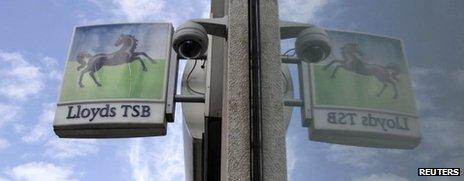Osborne green light to Lloyds privatisation
- Published
- comments

So as I expected this morning (Commission backs Lloyds as first privatisation), the chancellor is today in his Mansion House speech firing the starting gun on privatisation of a big chunk of Lloyds before the election, and signalling that RBS is unlikely to see shares sold to private-sector investors till the next parliament.
On Lloyds, the first part of the privatisation could literally happen any day, although I don't expect it till the autumn.
The chancellor has decided that the initial tranche, worth presumably a couple of billion pounds or so, will be sold to investment institutions rather than retail investors.
That means a lengthy prospectus does not need to be prepared, but the shares can be placed in the market at a time of the chancellor's choosing.
However there is likely to be an opportunity for retail investors to buy the shares, but at a later date.
RBS split?
As for RBS, George Osborne doesn't believe it will be in a state to sell to investors till after mid 2015, which is when the coalition says it will go to the country.
Partly that's because there may have to be a serious reconstruction of RBS, in that the chancellor is also announcing that the Treasury - aided by outside experts - will review whether it makes sense to hive off RBS's supposedly bad assets into a new "bad bank" which would remain in the public sector.
A decision on whether to split RBS in that way will be taken in the autumn (and for what it's worth, I am told the chancellor had already decided to carry out this review, before he knew that the Banking Commission would call for such an assessment).
Interestingly, the chancellor is now of the view that it would have been a good thing to break up RBS shortly after it was rescued in 2008 - though he is not throwing stones at Labour, which was in power at the time, for failing to do this because he wasn't calling for such a dismantling at the time.
Anyway, the review will look in particular at whether RBS's bad commercial property and Irish loans should be stripped out and retained in the public sector - till they are repaid or sold separately (see here for more on this).
The final decision on whether to sanitize RBS in this way will depend on whether it is seen to facilitate eventual privatisation, whether it would be good for taxpayers and whether it would support Britain's economy.
Domestic focus
Before I continue, I should point out that those are the three tests for all the chancellor's future decisions on banks.
In the meantime, RBS will be under orders from the chancellor to become a much simpler and more domestic bank, concentrating on services for retail customers, small businesses and larger corporates in Britain.
Which implies that George Osborne wants RBS to accelerate the shrinkage of its global investment bank and not drag its feet on selling its US operation, Citizens.
Finally Mr Osborne is telling the City this evening that the forced sales by Lloyds and RBS of retail and small business banking operations- known by the respective monikers of Project Verde and Project Rainbow - may not be ambitious enough.
He is asking the Office of Fair Trading to assess by the end of the year whether each of them should be obliged to sell rather more branches than currently planned, so as to create bigger and more effective competitor banks.
Punch-up
But to get back to the fairly imminent Lloyds privatisation, it won't happen until the share price is comfortably above 61p - and today the price is almost bang on 61p.
The magic of that price is that - as a result of public sector accounting conventions - sales below lead to an increase in the national debt and above it reduce the national debt.
This is where it gets a bit complicated, so you are at liberty to stop reading here. But I need to point out that 61p is substantially below the price taxpayers actually paid for their 39% investment in Lloyds, which was 73.6p.
That 61p is the level at which the shares are valued in the government's accounts: the Treasury booked the value of the stake at the share price prevailing on the day of the transaction to buy the shares closed, rather than the cash price.
Now there are many who believe that the government should strive to get back the cash it invested in Lloyds, viz 73.6p per share, £20bn, rather than the accounting value, or £16.6bn.
So you should expect a bit of a punch-up between Labour and the coalition government, Balls and Osborne, on whether that £3.4bn difference between the cash and accounting value of the state's Lloyd's shares is spilt milk and should be written off.
That said, as I understand it, Osborne thinks it is plausible he will eventually get back the full £20bn or 73.6p. He's just not religious about its importance.